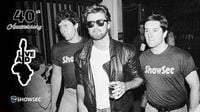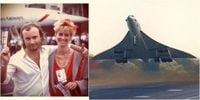On July 13, 2025, the music world gathered to celebrate the 40th anniversary of Live Aid, the landmark 1985 benefit concert that forever changed the landscape of charity and live music. Harvey Goldsmith, the promoter behind the original event, marked the occasion with a gala for the new theatrical production "Just For One Day: The Live Aid Musical" at London’s Shaftesbury Theatre. This musical, which premiered at London’s Old Vic before a North American run in Toronto, has already raised a million pounds for the Band Aid Charitable Trust, a cause Goldsmith still champions as a trustee.
Live Aid was a monumental feat of organization and goodwill, held simultaneously at Wembley Stadium in London and JFK Stadium in Philadelphia on July 13, 1985. The concerts were broadcast via satellite to 110 countries, reaching over a billion viewers and raising an astounding £140 million for Ethiopian famine relief. The London lineup read like a who’s who of 1980s rock and pop legends: Queen, David Bowie, Elton John, Wham!, The Who, Paul McCartney, U2, Sting, Dire Straits, Tears For Fears, and Bryan Ferry, among others. Across the Atlantic, Philadelphia’s stage was graced by Mick Jagger, Madonna, Rod Stewart, Neil Young, Duran Duran, and Bryan Adams. One of the most talked-about moments was Phil Collins’ remarkable feat of performing at both venues on the same day, flying from London to Philadelphia aboard Concorde.
Goldsmith, who was managing Roger Waters and arranging a Bruce Springsteen tour at the time, recalled the whirlwind pace at which Live Aid came together. The idea evolved from Bob Geldof’s realization that the Band Aid single "Do They Know It’s Christmas?"—which raised £8 million—was only a small start. Geldof wanted a massive concert at Wembley, initially clashing with Springsteen’s booked dates, but eventually settling on July 13. The U.S. venue was a challenge to secure, with New York and other major stadiums unavailable. After much negotiation, Philadelphia’s Mayor Wilson Goode offered JFK Stadium, a decision that fit symbolically with Philadelphia’s status as the home of the Liberty Bell.
Organizing two simultaneous concerts without today’s technology was a Herculean task. Goldsmith credited his "A-team" of production managers and engineers for pulling it off, including experts who had worked on the Los Angeles Olympics broadcast. They coordinated 13 satellites and 22 transponders to transmit the event globally. The BBC played a crucial role in broadcasting, with the network’s leadership embracing the cause early on, helping secure worldwide coverage from Japan’s NHK to MTV in America, and even including countries like Russia and China, which was unprecedented.
One of the keys to Live Aid’s smooth flow was meticulous timing. Each artist was allotted 18 to 20 minutes, and a circular stage was used to enable quick changeovers. Goldsmith enforced strict rules: only the performing artist, the previous act, the next act, and crew could be onstage during transitions. To keep everyone on schedule, he bought 40 large clocks and wore one around his neck with a note reminding artists to stick to their set times. This discipline paid off, with performers understanding the importance of the cause and cooperating despite their egos.
Phil Collins’ double performance remains one of the event’s most legendary stories. After finishing a 32-minute set in London alongside Sting and Branford Marsalis, Collins was whisked by helicopter to Heathrow, then boarded Concorde for a supersonic flight to New York, where another helicopter awaited to take him to Philadelphia. There, he performed with Eric Clapton, delivered a solo set, and joined Led Zeppelin members Robert Plant, Jimmy Page, and John Paul Jones for a reunion performance. Despite the logistical triumph, the Led Zeppelin set was fraught with issues—from an out-of-tune guitar to lack of rehearsal—leading Collins to describe it as "shambolic." Yet, his endurance and commitment symbolized the spirit of Live Aid.
The night before the concert, the Wembley stage’s turntable broke down, threatening to derail the event. Goldsmith personally intervened, calming the exhausted crew with crates of ice-cold beer and helping to fix the problem. Another challenge came when artist manager Tommy Mottola demanded Hall & Oates be included in the ABC primetime broadcast, threatening to pull Mick Jagger and Tina Turner otherwise. Goldsmith stood firm, and all artists ultimately performed.
Live Aid’s fundraising model was inspired by Jerry Lewis’s annual Muscular Dystrophy telethon in the U.S., encouraging viewers worldwide to pledge donations via phone. The response was initially slow until the Canadian Broadcasting Corporation aired The Cars’ "Drive" video alongside harrowing images of famine victims, sparking a surge in donations. The event’s success demonstrated the power of global broadcast and collective action long before the internet era.
Remarkably, the Band Aid Charitable Trust remains active 40 years later, distributing £6 to £7 million annually to projects in the Sahel Belt countries—including Sudan, Chad, Mali, and Eritrea—beyond Ethiopia. Goldsmith and lawyer John Kennedy, who still sign the checks, emphasize transparency and local participation in funded projects, supporting clinics, water wells, schools, shelters, and crop development. None of the trustees have ever taken payment, underscoring their dedication.
Meanwhile, a four-part CNN documentary series, "Live Aid: When Rock ’n’ Roll Took on the World," is currently airing, delving into the concerts’ history and impact. The series highlights iconic performances from Queen, Tina Turner, David Bowie, Paul McCartney, Hall and Oates, and U2, and explores how Live Aid helped revitalize Philadelphia’s image. The second installment aired on July 20, with the final episode scheduled for August 3, 2025.
July also marks the anniversary of Live8, the 2005 follow-up concert organized to pressure global leaders to "Make Poverty History." Held in London’s Hyde Park with over 200,000 attendees, Live8 featured stars like Paul McCartney, U2, Madonna, Coldplay, and a Pink Floyd reunion. Showsec, the security and crowd management company, played vital roles in both Live Aid and Live8, managing access and safety for tens of thousands of attendees, highlighting the unsung heroes behind these massive events.
Reflecting on Live Aid’s legacy, Harvey Goldsmith remarked, "We’ve already gotten a million pounds as our share, which is fantastic," referring to the musical’s fundraising. His dedication over four decades has helped sustain the Band Aid Charitable Trust and keep the spirit of Live Aid alive. The event remains a testament to the power of music to unite people worldwide for a common cause, proving that with determination, teamwork, and a shared vision, even the most daunting challenges can be overcome.


